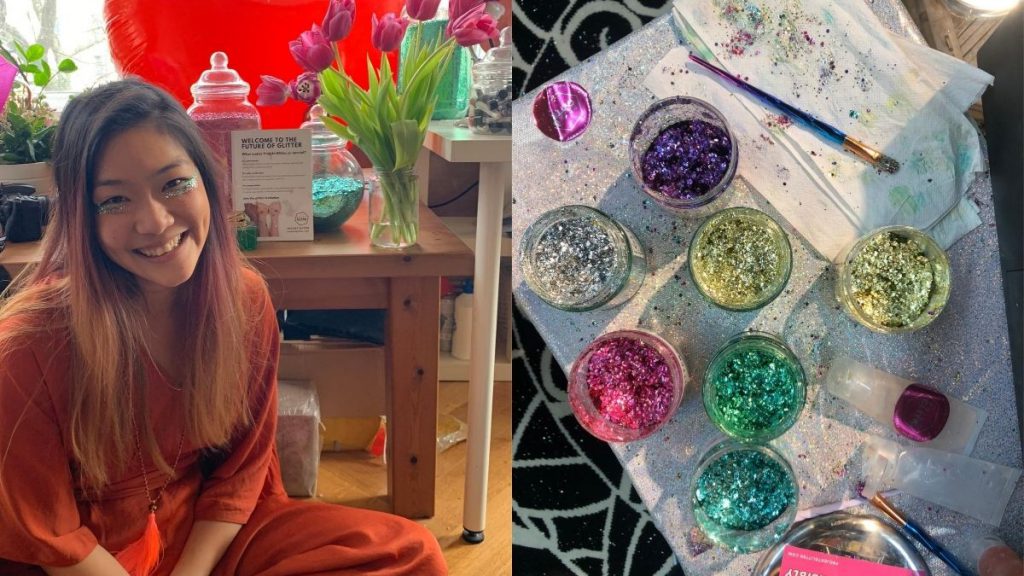For Jeen, starting a business in Berlin was never part of her plan.
“I left Malaysia 15 years ago to study Industrial Design in the UK. After graduating, I moved to London and worked in a Service Design agency for 4 years before deciding it was time to look for a new challenge,” she shared.
4 years into starting Projekt Glitter, her products are already being shipped to 7 countries in Europe and the US.
They’re also stocked in several retail shops around Germany and the UK, including Anthropologie and Dolls Kills in the US.
Her biggest challenge arose when she was first starting up the brand and had to manage everything herself whilst working full time.
“I was the photographer, social media manager, customer support, postage and packaging person, web designer, copywriter. Everything you can imagine!” she exclaimed.
Whenever she had no free time for anything else, she’dquestion if she wanted to continue this. But ultimately, passion and the desire to create kept her going.
Glitter Doesn’t Come From Trees… Right?
Projekt Glitter is a plant-based glitter used as body and face makeup, a trend in Europe’s festival culture.
The glitter can also be used for decoration purposes along with arts and crafts.
It’s created from cellulose, a natural plant-based film.
“This film is made from the fibres of Eucalyptus trees, which we source from responsibly managed plantations in Europe,” Jeen said.
Once the glitter is washed off, it takes about 3 months for it to biodegrade through heat, water, oxygen, and microorganisms.
This makes it a sustainable alternative to traditional plastic ones, which contain microplastics and microbeads that take over 1,000 years to degrade.

The idea for the company came up in 2016 from a combination of Jeen’s love for festivals, the planet, and you guessed it, glitter.
As a Malaysian, we were wondering why Jeen decided to start her business all the way in Berlin and not in her home country, or even ship the products to Asia.
It’s because her target market was largely centred around Europe’s festival culture, which she was also more familiar with after having lived there so long, she replied.
She actually had plans to bring Projekt Glitter to Asia this year, but COVID-19 has since delayed them.
Around the world, some of her biggest competitors would be festival fashion and accessories brands like Shrine from the US, and Go Get Glitter from the UK.
Go Get Glitter isn’t in the eco-friendly glitter scene while Shrine is. However, Jeen still manages to set Projekt Glitter’s products apart by focusing on end-to-end sustainability.
Sustainability, But Make It Fashion
As people become more aware of the global plastic problem, there’s an urgency to switch to a more sustainable way of living, beginning by changing our consumption habits.
Creating plant-based glitter isn’t cheap. In fact, it’s 4 times more expensive than regular cosmetic glitter on the market.
This is because Jeen manufactures her product in Germany, not China.

“When talking about cost you have to also factor in the long term cost of plastic glitter, which is a microplastic, and its effects on the planet,” she said
“My target audience are those who understand and care about the impact their lives have on the environment and will buy products accordingly.”
Knowing this, she was confident that if the alternative existed, people would definitely make the switch.
Glitter is a luxury commodity, and one tube of our glitter will last several festival seasons, so if you care enough about the impact you have on the world but still want to sparkle without the guilt, then the higher price of glitter is actually nothing in the grand scheme of things.
Jeen, founder of Projekt Glitter
Big Makeup Brands Need To Make The Switch Too
Large corporations are typically the ones who have the most influence in starting or ending trends, meaning that they control the behaviour of mass consumers.
For example, if these companies stopped creating makeup with plastic glitter, their customers would follow as they wouldn’t have access to the product anymore.
However, I don’t believe companies would make the switch to plant-based glitter so easily.
There will need to be incentives for large makeup brands to make this switch and use Projekt Glitter’s products.
Despite knowing this, Jeen is hopeful.
Microbeads have already been banned in Europe and the US, so there is already growing pressure for microplastics like glitter to go in that direction as policies change.
“Having said that, I have seen a growing trend in consumers looking for more sustainable solutions, at least in Europe, which has been driving beauty brands to create more eco-friendly lines,” she added.

Currently, Projekt Glitter gets around 1,000 orders through their website per year. They ship to countries including the US, Brazil, and Switzerland to name a few.
Since launching, all profits have been reinvested back into the business, allowing them to break even each year.
Though Projekt Glitter still a passion project for Jeen, she is in the works of expanding her product line and hopes to expand the business in the coming years.
- You can learn more about Projekt Glitter here.
- You can read more about other Malaysian startups here.
Featured Image Credit: Projekt Glitter













